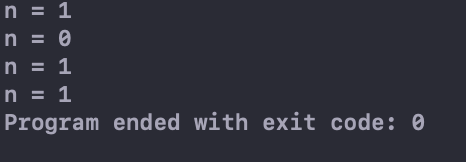c++的多线程可以充分利用计算机资源,提高代码运行效率。在这里总结了一些多线程应用过程中的基本概念和用法。
一、进程与线程
进程是资源分配和调度的一个独立单位。而线程是进程的一个实体,是CPU调度和分派的基本单位。
一个进程至少拥有一个线程。
在同一个进程中的多个线程的内存资源是共享的,也就是说各线程都可以改变进程中的变量。因此在执行多线程运算的时候要注意执行顺序。
二、并发、并行的概念
并行(parallellism)指的是多个任务在同一时刻同时在执行。
而并发(concurrency)是指在一个时间段内,多个任务交替进行。虽然看起来像在同时执行,但其实是交替的。
三、新建线程
1)简单使用
#include <iostream> #include <thread> using namespace std; void f() { cout<<"thread 1 is running"<<endl; this_thread::sleep_for(chrono::seconds(1)); } int main() { thread t1(f); //创建线程,一旦创建完毕,马上开始运行。 t1.join(); }
运行结果

2)带函数参数的线程
当需要向线程函数传递参数时,直接在创建线程时,同时也把参数作为入参传递给线程函数。注意当调用函数的参数为引用参数时,线程调用需要加上ref关键字表示引用。并且线程函数会改变引用的变量值。
void f1(int n) { n++; cout<<"n = "<< n <<endl; } void f2(int &n) { n++; cout<<"n = "<<n<<endl; } int main() { int n = 0; thread t1(f1, n); t1.join(); cout<<"n = "<<n<<endl; thread t2(f2, ref(n)); t2.join(); cout<<"n = "<<n<<endl; }
运行结果为:

3)替换线程
void f2(int &n) { n++; cout<<"n = "<<n<<endl; } int main() { int n = 0; thread t3(f2, ref(n)); thread t4(move(t3)); //此时t4正在运行f2(),t3不再是一个线程了。 t4.join(); }
运行结果:

4)调用类成员函数
class foo { public: void bar1(int n) { cout<<"n = "<<n<<endl; } static void bar2(int n) { cout<<"static function is running"<<endl; cout<<"n = "<<n<<endl; } }; int main() { foo f; thread t1(&foo::bar1, &f, 5); //注意在调用非静态类成员函数时,需要加上实例变量。 t1.join(); thread t2(&foo::bar2, 4); t2.join(); }
四、线程操作
1) join
join的意思就是等待子进程完成,再继续主进程。即使线程在调用join前已经执行完毕,join也是有用的。
void f1(int n) { cout<<"thread "<<n<<" is running"<<endl; } int main() { thread t1(f1, 1); //开始运行线程t1 thread t2(f1, 2); //开始运行线程t2 thread t3(f1, 3); //开始运行线程t3 t1.join(); //等待线程t1执行完毕 t2.join(); //等待线程t2执行完毕 t3.join(); //等待线程t3执行完毕 }
注意用多个线程同时启动后,实际是并发执行。由cpu的控制台来决定当前调用哪个线程。所以实际运行过程可能会多次交替,线程1 - 线程2 - 线程1 - 线程3 - 线程1.....所以得到的结果是混乱的。
而每次运行的结果都可能都不一样。
第一次运行结果:

第二次运行结果:

假如需要在运行线程t2之前,结果t1,那么就可以在t2之前,执行t1.join()。
void f1(int n) { cout<<"thread "<<n<<" is running"<<endl; } int main() { thread t1(f1, 1); //开始运行线程t1 t1.join(); //等待线程t1执行完毕 thread t2(f1, 2); //开始运行线程t2 thread t3(f1, 3); //开始运行线程t3 t2.join(); //等待线程t2执行完毕 t3.join(); //等待线程t3执行完毕 }
运行结果:

2)detach
detach操作可以将线程分离,允许线程独立执行。等到线程执行完毕后,系统会自动将资源回收。
void independentThread() { cout<<"start concurrent thread"<<endl; cout<<"Exiting concurrent thread"<<endl; } void threadCaller() { cout<<"Start thread caller"<<endl; thread t(independentThread); t.detach(); //将线程分离 cout<<"Exiting thread caller"<<endl; } int main() { threadCaller(); }
注意:每个线程要么detach,独立运行,然后系统自动回收资源;要么join,也就是让主线程等待子线程结束之后,主线程将资源回收。
如果两个操作都不执行,可能会出现内存泄漏。
3)线程暂停
如果让线程从外部暂停会引发很多并发问题,这也是为什么std::thread没有直接提供pause函数的原因。如果线程在运行过程中,确实需要停顿,就可以用this_thread::sleep_for。
void threadCaller() { this_thread::sleep_for(chrono::seconds(3)); //此处线程停顿3秒。 cout<<"thread pause for 3 seconds"<<endl; } int main() { thread t(threadCaller); t.join(); }
4)获取当前线程号
int main() { thread::id main_threadId = this_thread::get_id(); cout<<main_threadId<<endl; }
运行结果:

参考:https://www.jianshu.com/p/dcce068ee32b
https://en.cppreference.com/w/cpp/thread/thread